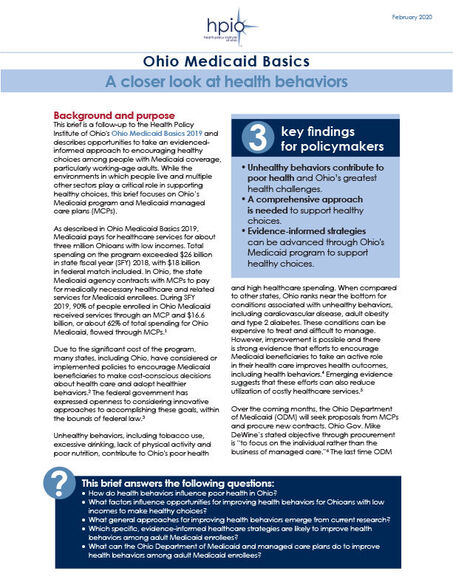Ohio Medicaid Basics:
A Closer Look at Health Behaviors
The Ohio Department of Medicaid, through contracts with managed care plans, pays for healthcare services for about 1 in 4 Ohioans. In 2019, Ohio Gov. Mike DeWine’s administration began the process of procuring new managed care plan contracts, which has not happened in Ohio since 2012. This means that Ohio policymakers have a rare opportunity to address some of Ohio’s greatest health challenges through managed care plan procurement.
3 Key findings for policymakers
- Unhealthy behaviors contribute to poor health and Ohio’s greatest health challenges.
- A comprehensive approach is needed to support healthy choices.
- Evidence-informed strategies can be advanced through Ohio’s Medicaid program to support healthy choices.
The challenge
Unhealthy behaviors, including tobacco use, excessive drinking, lack of physical activity and poor nutrition, contribute to Ohio’s poor health and high healthcare spending. When compared to other states, Ohio ranks near the bottom for conditions associated with unhealthy behaviors, including cardiovascular disease, adult obesity and type 2 diabetes. These conditions can be expensive to treat and difficult to manage.
Given Ohio Medicaid’s role as one of the largest healthcare payers in the state, the Ohio Department of Medicaid and managed care plans have considerable leverage to encourage and incentivize healthy choices. However, based on Health Policy Institute of Ohio’s review of publicly-available documents, Ohio Medicaid does not have a comprehensive approach to improve health behaviors among enrollees.
Improvement is possible
This policy brief highlights evidence-informed policy options that the Ohio Department of Medicaid and managed care plans can advance within the healthcare system to support healthy behaviors among enrollees. There are, however, many factors beyond health care that influence health behaviors. A comprehensive approach to improve health behaviors and overall health requires partnerships between Ohio Medicaid and other sectors, such as housing, transportation, education and workforce development.
By:
Zach Reat, MPA, HPIO
Published On
February 7, 2020
Table of Contents
 Download Publication
Download Publication
